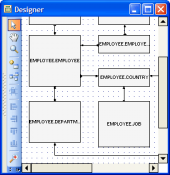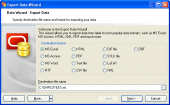Oracle Maestro online help
| Prev | Return to chapter overview | Next |
Editing properties
The Parameters tab contains the list of the current procedure parameters with its options. Here you can view the Name and the Type of each parameter of the procedure, and the parameter's Scope
The Errors tab displays all the necessary information about object errors. If an error have occurred during the object compilation it appears in the list with some additional properties: Order (one after another), Line and Position (object definition location the error was found out), Error (corresponding PL/SQL exception).
Parameters can be edited within the Parameter Editor dialog window. In order to open the dialog you should
| • | open the object in its editor and the Parameters tab there; |
| • | select the parameter to edit; |
| • | press the Enter key or select the Edit Parameter item from the popup menu (alternatively, you may use the corresponding link of the Navigation Bar). |
The Definition field contains the definition of the procedure.
Name
Defines the procedure name.
Note: the name of the object must be unique among all the object names in its container. Moreover, all the objects that are source of data need unique names among themselves. You can use any identifier that is allowed by Oracle server.
Owner
There is the owner for the procedure.
Created
The field displays the date the object was created.
Last DDL time
Use the field to find the date when the last data definition language (DDL) operation was performed on the current object. The Last DDL time can help you to find if any changes to the object definitions have been made on or after a specific time.
Invoker rights (DEFINER, CURRENT USER)
Specify DEFINER to indicate that the procedure executes with the privileges of the owner of the schema in which the procedure resides, and that external names resolve in the schema where the procedure resides. Specify CURRENT USER to indicate that the procedure executes with the privileges of CURRENT USER. This clause also specifies that external names in queries, DML operations, and dynamic SQL statements resolve in the schema of CURRENT USER. External names in all other statements resolve in the schema in which the procedure resides.
To apply the changes, select the Apply Changes item in the Navigation bar or use Ctrl+F9 or Ctrl+F7 shortcut keys.
It is also possible to modify object properties without opening the object editor: use the Object Properties item of the popup menu of the selected object from the explorer tree.
| Prev | Return to chapter overview | Next |





 Download
Download Buy
Buy
